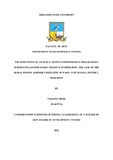Please use this identifier to cite or link to this item:
https://cris.library.msu.ac.zw//handle/11408/2052| Title: | The effectiveness of rural women empowerment programmes in reducing gender based violence in zimbabwe: the case of the rural women assembly initiative in ward 15 of Nyanga district, Zimbabwe | Authors: | Bote, Takaitei | Keywords: | Rural women empowerment Gender based violence |
Issue Date: | 2015 | Publisher: | Midlands State University | Abstract: | Gender based violence (GBV), a universal challenge that has left no stone unturned globally, has reared its ugly head in Zimbabwe, affecting more women than men. Although several players such as government and civic society organisations have united to implement various programmes that include campaigns to bring an end to GBV, it remains a never ending phenomenon. Driven by the need to help fight GBV, this study sought to establish the effectiveness of rural women empowerment programmes in reducing GBV using a case study of a Rural Women Assembly Initiative of Ward 15, Nyanga District, Zimbabwe. Using mixed research methodologies combining qualitative and quantitative, the Sarah Longwe and the Harvard gender analytical frameworks to measure the empowerment of women, the study revealed that poverty, a patriarchal society that discriminates women and normalization of GBV were the key drivers of GBV in Nyanga. The research unearthed that the RWA initiatives have helped improve women’s economic status with some contributing to household income resulting in them receiving some recognition at both household and community levels. The RWA has become a formidable force in the community enabling more women to report on GBV. The study found out that the RWA has reduced GBV to a limited extent. The study concluded that the RWA has not adequately addressed the empowerment of women resulting in the little impact with regards to reducing GBV. The women have achieved mostly the three levels of empowerment namely welfare, access and concientisation to some extent. However RWA members are limited in terms of control of resources, participation in decision making while the IGPs they are running are not economically viable. Levels of awareness and concientisation with regards to GBV are still limited among the RWA groups, men and other community members in Ward 15 and elsewhere in Zimbabwe. The research therefore recommended the strengthening of the RWA movement structurally and institutionally for it to effectively fight against GBV | URI: | http://hdl.handle.net/11408/2052 |
| Appears in Collections: | Master Of Arts In Development Studies |
Files in This Item:
| File | Description | Size | Format | |
|---|---|---|---|---|
| FINAL Edited Bote Dissertation ALL Chapters.pdf | Full Text | 2.26 MB | Adobe PDF |  View/Open |
Page view(s)
158
checked on Apr 18, 2025
Download(s)
530
checked on Apr 18, 2025
Google ScholarTM
Check
Items in MSUIR are protected by copyright, with all rights reserved, unless otherwise indicated.



